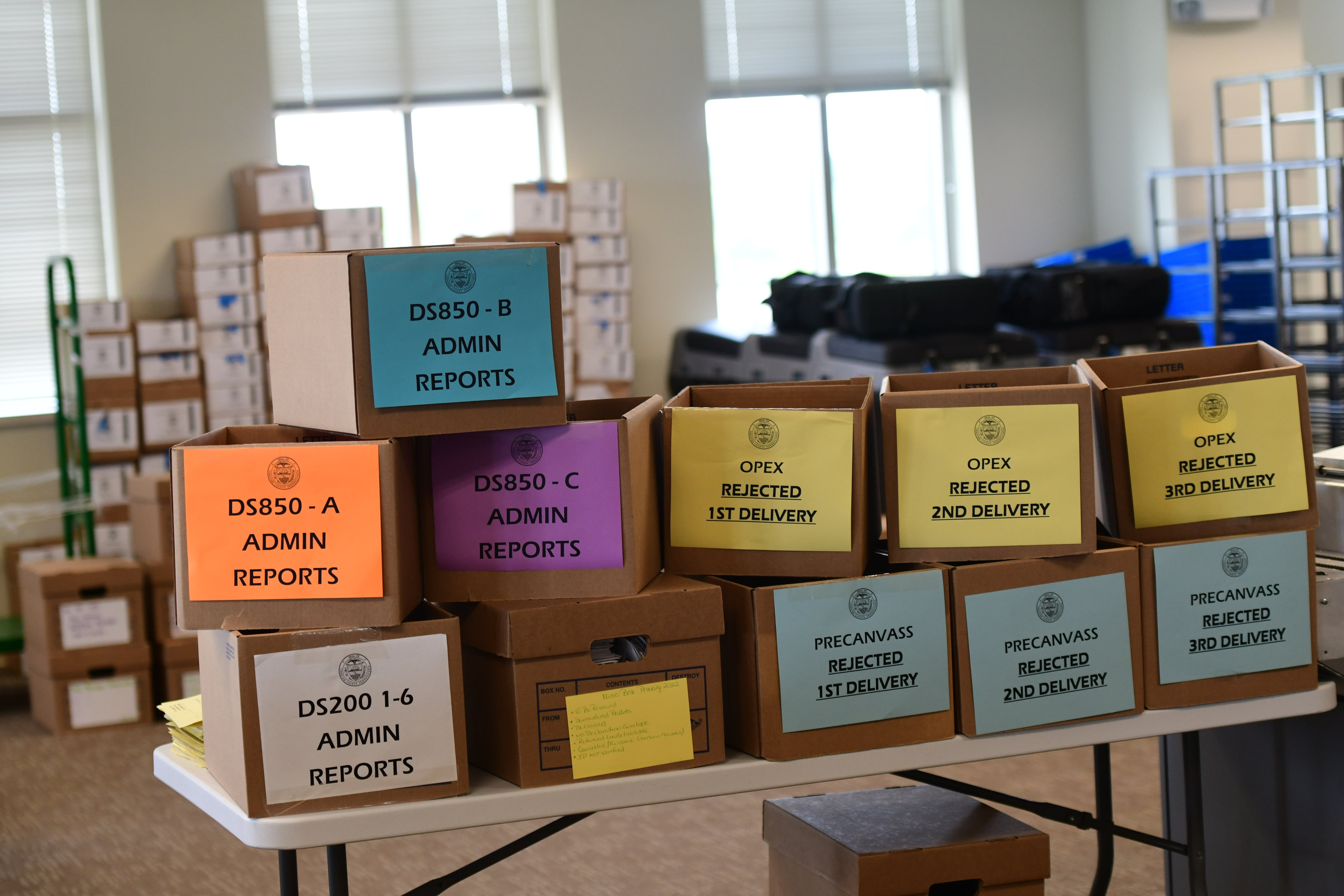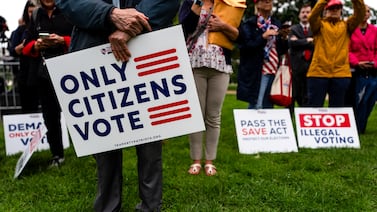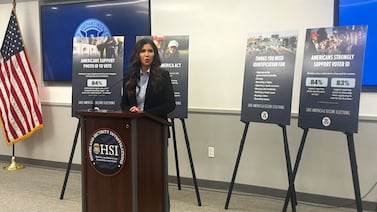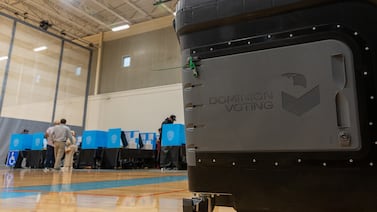Recount petitions, claiming without evidence that fraud occurred during Pennsylvania’s 2022 election, are now delaying the state’s certification of results.
An obscure section of state law allows such petitions to be easily filed, and right-wing groups appear to be exploiting that provision to an unprecedented degree this year, gumming up the works.
According to a spokeswoman for the state’s court system, 147 petitions were filed in 27 counties as of Thursday morning.*
The requests reviewed by Votebeat and Spotlight PA primarily target the races for governor and U.S. Senate, which were won by Democrats Josh Shapiro and John Fetterman.
The petitions, first reported by The Inquirer, are causing certification delays in at least three counties — Berks, Bucks, and Columbia — which in turn are delaying the state from certifying its overall results. Counties were required by the Pennsylvania Department of State to certify by Monday.
“I don’t think I’ve ever seen it at the level we’re seeing this year,” said Jeff Greenburg, Mercer County’s former longtime elections director. “They’ve been around, but never to this level, and what stands out to me this year is they are filing them simply based on a distrust of the [tabulation] machines.”
A provision of the Pennsylvania election code allows three voters in any precinct to request a recount if they believe “fraud or error” occurred in the election. The statute specifically says that they do not need to provide evidence for their claim.
The Department of State has advised counties that the only reason they should delay certification is due to “legally valid and properly filed” recount petitions, but they should certify other races not subject to recount petitions, according to a Wednesday afternoon statement.
Jim O’Malley, deputy director of communications for Bucks County, said that the county was waiting for a judge’s order on 22 separate petitions before it moves forward with certification.
At least 56 of Pennsylvania’s 67 counties — including Chester, Allegheny, and Westmoreland, which received recount petitions — had certified their results as of Wednesday. Columbia County plans to certify on Monday.
The petitions appear to have a cascading effect on the Pennsylvania Department of State, which needs to move forward with its statewide certification. On Wednesday, Acting Secretary of State Leigh Chapman was scheduled to be part of a panel on threats to elections in Washington, D.C., but was “held back in Pennsylvania due to the certification process,” organizers said. A spokeswoman for her office said Thursday the absence was due to a “scheduling conflict.”
Many of the petitions ask to have the recounts performed by hand, pointing to a portion of state law that says a judge will direct “persons designated by such court or judge” to perform the recount. However, in a case earlier this year regarding a Lancaster County recount petition, the state’s Commonwealth Court upheld a lower ruling that found the law does not require such a hand recount; the judge did grant the request for the recount, which was ultimately performed by machine.
Judges have so far rejected these hand-count requests, some citing this ruling, while still allowing the recounts to move forward, though a review of 101 petitions by Votebeat and SpotlightPA show that most are still pending judges’ rulings.
Notably, a Court of Common Pleas judge in Butler County dismissed three petitions because the petitioners were inspectors of elections in the precinct where they were claiming fraud or error had occurred, but had nonetheless certified their precinct’s results. The judge said those workers had an opportunity to address any errors before certifying the results and couldn’t raise allegations after the fact.
In other counties, including Columbia and Westmoreland, the petitions moved forward and judges have ordered recounts.
There has also been some disagreement among county judges as to whether the petitions need to show evidence of “fraud or error” in order to be valid. Some judges have pointed to another statute and dismissed petitions for lack of evidence.
“The dismissals are mostly procedural,” said Elizabeth Grossman, senior regulatory counsel at Informing Democracy, a nonprofit focused on the vote-counting process that has been tracking the petitions.
The primary statute does not instruct courts to gauge the merits of a petition, but rather determine whether it was submitted by qualified electors in a timely manner.
“The fact that these recounts are going forward doesn’t mean there is any merit,” Grossman said.
The Pennsylvania Department of State declined to comment Thursday on whether the statue required the count to be done by hand or if it should be amended to include an evidentiary burden.
Westmoreland County did not immediately respond to a request for comment on the results of its recounts. Columbia County said that it conducted its recount earlier this week, via machines not used in the election, and found only very small discrepancies that failed to shift any outcome.
“I believe it was only off by one or two [votes],” Thea Karas, assistant director of elections, said of the five precincts that were recounted. “It was very, very minuscule.”
Karas said the petitioners submitted no evidence showing fraud or error to support the allegations. The county plans to certify on Monday, she said.
The statute cited in the petitions says that evidence is not required for the petition to be valid, but some requesters have cited specific issues, such as improperly calibrated ballot marking devices, during court hearings.
Greenburg said something like this can be a legitimate issue that would make voters want to recount the results in a specific precinct, but he worries that these petitions are being used for “frivolous” reasons without evidence, which could lead to a “boy who cried wolf” situation when there are real problems.
The petition drive appears to be an effort of Audit the Vote PA and other groups that have promoted baseless conspiracy theories about elections, The Inquirer first reported last week. Audit the Vote’s Toni Shuppe was closely allied with Republican gubernatorial candidate Doug Mastriano, a major booster of unfounded election fraud claims who soundly lost the race for governor.
Audit the Vote PA first encouraged the tactic after the May primary when Mike Miller, its preferred candidate for a Lancaster County state Senate seat who had run the group’s canvassing effort there, lost his bid to unseat Republican Ryan Aument. Petitions in that case were dismissed on technical grounds, but one filed against state House Speaker Bryan Cutler did move forward to a machine recount.
In a statement Wednesday, Aument said the races targeted by recounts were won by large margins, and no one has presented evidence showing fraud or procedural issues. He added that unfounded efforts only undermine meaningful attempts at election integrity reform.
“If the law continues to be abused this way, I think we need a legislative change to safeguard taxpayer dollars and ensure election workers aren’t wasting their time administering hand recounts of elections for which there is no evidence that any malfeasance occurred,” he said. “I think we need some kind of evidentiary standard or burden of proof before unfounded accusations can be made and taxpayer dollars can be used to order costly recounts.”
Carter Walker is a reporter for Votebeat in partnership with Spotlight PA. Contact Carter at cwalker@votebeat.org .
Correction, Dec. 30, 2022: This article originally misstated the number of counties where recount petitions were filed. Updated information shows it was 27 counties, not 41 counties.






